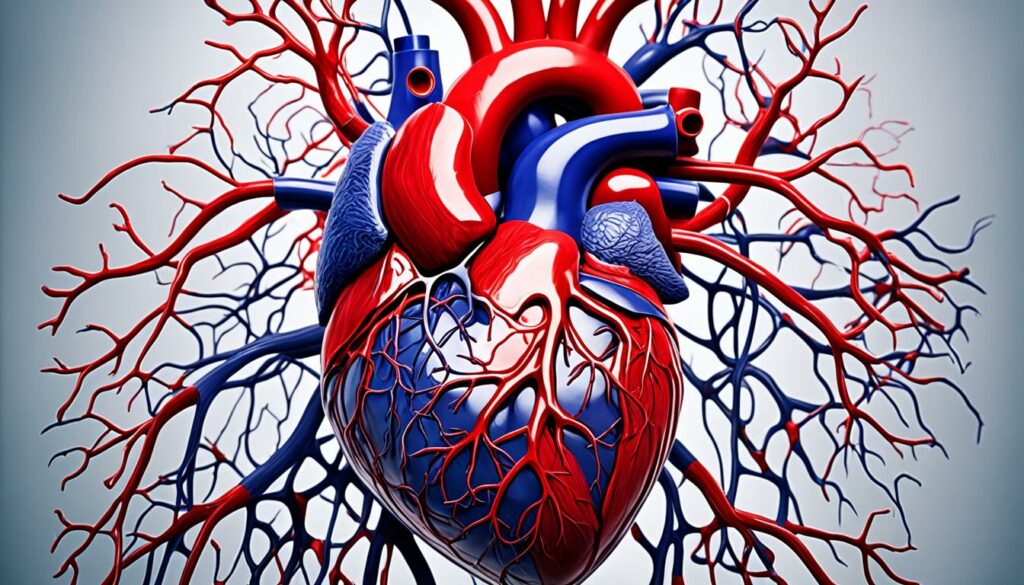Did you know that salmon is one of the most nutritious foods on the planet? It’s true! This flavorful fish is loaded with essential nutrients that can have a profound impact on your health.
From improving heart and brain health to aiding in weight management and muscle recovery, the health benefits of salmon are truly remarkable.
Key Takeaways:
- Salmon is a nutritional powerhouse, packed with protein, healthy fats, and essential vitamins and minerals.
- The omega-3 fatty acids in salmon have anti-inflammatory properties and can benefit heart and brain health.
- Including salmon in your diet can support weight management, muscle recovery, and overall well-being.
- Salmon is a rich source of vitamin D, which plays a crucial role in maintaining strong bones and a healthy immune system.
- Consuming salmon regularly can promote cardiovascular health and reduce the risk of chronic diseases.
Nutritional Value of Salmon
Salmon is a nutrient-dense food that provides important vitamins and minerals. Whether it’s wild-caught or farmed, salmon offers a range of health benefits due to its impressive nutritional profile.
Here’s a breakdown of the key nutrients found in salmon:
Omega-3 Fatty Acids
Salmon is known for its high content of omega-3 fatty acids, particularly EPA (eicosapentaenoic acid) and DHA (docosahexaenoic acid). These heart-healthy fats play a crucial role in reducing inflammation, supporting brain health, and promoting overall well-being.
Selenium
Salmon is an excellent source of selenium, a mineral that is essential for various bodily functions. Selenium is involved in DNA synthesis, thyroid hormone metabolism, and reproductive health.
B Vitamins
Salmon is packed with B vitamins, including vitamin B12, which is crucial for red blood cell production and maintaining a healthy central nervous system.
Other B vitamins found in salmon, such as vitamin B6, niacin, riboflavin, pantothenic acid, thiamine, and folic acid, are important for energy production, DNA synthesis, and reducing chronic inflammation.
Vitamin D
Salmon is a natural source of vitamin D, which plays a vital role in bone health, immune function, and overall well-being.
Potassium
Salmon is also rich in potassium, an essential mineral that helps regulate blood pressure, balance fluids in the body, and support proper muscle and nerve function.
Including salmon in your diet can help ensure you get a wide range of essential nutrients that contribute to your overall health and well-being.
| Nutrient | Amount per 100g |
|---|---|
| Omega-3 Fatty Acids | 2,260mg |
| Selenium | 40.5mcg |
| Vitamin B12 | 3.2mcg |
| Vitamin D | 10.9IU |
| Potassium | 384mg |
Table: Nutritional composition of salmon per 100g. (Source: USDA National Nutrient Database)
Including salmon in your diet is a delicious and nutritious way to support your health and enjoy the numerous benefits it has to offer.
Omega-3 Fatty Acids in Salmon
Salmon is particularly rich in omega-3 fatty acids, specifically eicosapentaenoic acid (EPA) and docosahexaenoic acid (DHA). These long-chain omega-3 fatty acids have been shown to have numerous health benefits.
- Heart Health: Omega-3 fatty acids in salmon can reduce inflammation, lower blood pressure, and decrease the risk of heart disease and stroke.
- Brain Health: Consuming salmon regularly supports brain health and can improve cognitive function, thanks to the omega-3 fatty acids it contains.
- Inflammation: The omega-3 fatty acids in salmon have anti-inflammatory properties, which can help reduce inflammation throughout the body.
- Cardiovascular Health: Regular intake of omega-3 fatty acids from salmon promotes cardiovascular health by lowering the risk of heart disease and maintaining healthy blood pressure levels.
To benefit from these essential fats, include salmon in your diet regularly. It’s not only a delicious addition to your meals but also an excellent source of omega-3 fatty acids that can support your overall health and well-being.
Protein Content of Salmon
Salmon is a powerhouse when it comes to protein. Protein is essential for the growth and repair of tissues in our bodies, including muscles, bones, and cartilage. It plays a crucial role in muscle recovery, weight management, bone health, and even maintaining a healthy metabolic rate.
Just how much protein does salmon contain? Let’s take a look at the nutritional values:
| Salmon Type | Protein Content per 100g |
|---|---|
| Wild-Caught Salmon | 22-25g |
| Farmed Salmon | 19-22g |
As you can see, both wild-caught and farmed salmon are excellent sources of protein. Consuming salmon as part of a balanced diet can help meet your daily protein needs.
Whether you’re an athlete looking to support muscle recovery, someone aiming for weight loss, or simply interested in maintaining healthy bones, salmon’s protein content can be a valuable addition to your diet.
Incorporate salmon into your meals and experience the benefits it brings to your overall health and well-being.
Salmon and B Vitamins
Salmon is an excellent source of several B vitamins, including vitamin B12, vitamin B6, niacin, riboflavin, pantothenic acid, thiamine, and folic acid. These essential vitamins play a vital role in maintaining optimal health and functioning of the body.
Vitamin B12 is crucial for energy production and is necessary for the formation of red blood cells. It also supports the health of the brain and nervous system. Deficiency in vitamin B12 can lead to fatigue, weakness, and neurological problems.
Vitamin B6 is essential for DNA synthesis, which is the process by which genetic material is produced. It also plays a role in the production of neurotransmitters, which are involved in brain function and mental well-being.
Niacin, also known as vitamin B3, is important for energy metabolism and is involved in over 400 enzymatic reactions in the body. It supports heart health by helping to regulate cholesterol levels and promoting normal blood flow.
Riboflavin, or vitamin B2, is necessary for energy production and the metabolism of carbohydrates, fats, and proteins. It also acts as an antioxidant, protecting cells from damage caused by harmful free radicals.
Pantothenic acid, or vitamin B5, is involved in energy production and the synthesis of hormones, cholesterol, and hemoglobin. It also supports the health of the skin and helps maintain a healthy nervous system.
Thiamine, or vitamin B1, is essential for energy metabolism and the proper functioning of the nervous system. It also plays a role in maintaining a healthy cardiovascular system.
Folic acid, or folate, is important for DNA synthesis and cell division. It is especially important during periods of rapid growth, such as infancy and pregnancy. Adequate intake of folic acid is essential for heart health and the prevention of certain birth defects.
Incorporating salmon into your diet is a delicious way to ensure you get an adequate intake of these essential B vitamins. Whether it’s grilled, baked, or added to salads, salmon is a versatile fish that offers numerous health benefits.

Health Benefits of the Astaxanthin in Salmon
Salmon contains astaxanthin, a powerful antioxidant that belongs to the carotenoid family. Astaxanthin provides numerous health benefits, making it an essential component of a healthy diet.
Astaxanthin has been shown to lower the risk of heart disease by reducing the oxidation of LDL cholesterol and increasing levels of HDL cholesterol, the “good” cholesterol. This helps prevent the buildup of plaque in the arteries, improving heart health.
Furthermore, astaxanthin has anti-inflammatory properties and can reduce oxidative stress in the body. It works to neutralize harmful free radicals and protect cells from damage. By reducing inflammation and oxidative stress, astaxanthin promotes overall well-being.
In addition to its impact on heart health, astaxanthin also benefits the brain and nervous system. It has been shown to support brain function and cognitive health. Astaxanthin crosses the blood-brain barrier and helps protect brain cells from oxidative damage, promoting optimal brain function.
Not only does astaxanthin benefit internal health, but it can also improve the appearance and health of the skin. Astaxanthin has been found to have a protective effect against UV-induced skin damage.
It helps reduce the production of inflammatory compounds triggered by sun exposure and helps maintain skin elasticity, promoting a more youthful appearance.
Consuming salmon varieties with higher astaxanthin content can provide these health benefits. Including astaxanthin-rich salmon in your diet is an excellent way to support heart health, brain function, and skin health.
“Astaxanthin has impressive antioxidant properties and offers a wide range of health benefits, including improved cardiovascular health, enhanced brain function, and promotion of youthful skin.”
To fully understand the astaxanthin content in different salmon varieties, refer to the following table:
| Salmon Variety | Astaxanthin Content |
|---|---|
| Wild Alaskan Salmon | High |
| Atlantic Salmon | Low |
| Chinook Salmon (King Salmon) | High |
| Coho Salmon (Silver Salmon) | Medium |
| Sockeye Salmon (Red Salmon) | Medium |
As seen in the table, wild Alaskan salmon and certain salmon species, such as Chinook salmon, are known for their higher astaxanthin content. These varieties can provide even greater health benefits due to their increased antioxidant levels.
The Role of Salmon in Heart Health
Eating salmon regularly can have a significant impact on heart health. This delicious fish is rich in omega-3 fatty acids, which have been proven to improve cholesterol levels, reduce inflammation, and lower the risk of cardiovascular disease.
Omega-3 fatty acids, found abundantly in salmon, help to lower and regulate cholesterol levels in the body. They can increase the levels of HDL cholesterol (the good cholesterol) and decrease LDL cholesterol (the bad cholesterol), promoting a healthier cardiovascular system.
In addition, the omega-3 fatty acids in salmon can lower blood pressure and triglyceride levels, two significant risk factors for heart disease. High blood pressure can strain the heart and lead to various cardiovascular problems, while high triglyceride levels can contribute to the development of arterial plaques.
The consumption of fish, including salmon, has been associated with a lower risk of heart disease. Incorporating this nutritious fish into your meals can be a proactive step towards maintaining a healthy cardiovascular system.
It’s important to note that not all fat is harmful to the heart. The omega-3 fatty acids found in salmon are heart-healthy fats that provide numerous benefits for cardiovascular health. By including salmon in your diet, you can support your heart and overall well-being.

Conclusion
Incorporating salmon into your diet can provide a multitude of health benefits. This incredibly nutritious fish is packed with omega-3 fatty acids, protein, B vitamins, potassium, selenium, and astaxanthin.
By regularly consuming salmon, you can support heart health, improve brain function, reduce inflammation, aid in weight management, and ensure your body receives essential nutrients for overall well-being.
Salmon’s omega-3 fatty acids play a crucial role in promoting heart health by reducing the risk of cardiovascular disease and improving cholesterol levels. Additionally, these fatty acids support brain function and may help prevent cognitive decline.
The anti-inflammatory properties of salmon can benefit various aspects of health, from reducing joint inflammation to protecting against chronic diseases.
Salmon is a fantastic addition to any weight management plan. Its high protein content helps with muscle recovery and maintenance, and its nutrient density contributes to feeling satisfied and nourished. Whether you opt for wild-caught or farmed salmon, both provide valuable nutritional benefits that can positively impact your health and well-being.
So, whether you enjoy grilled salmon fillets, savory salmon salads, or flavor-packed sushi rolls, incorporating this versatile fish into your meals is a delicious way to enhance your health and enjoy the numerous health benefits it offers.
FAQ
What are the health benefits of salmon?
Salmon provides numerous health benefits due to its high nutritional content. It is rich in omega-3 fatty acids, which promote heart and brain health, reduce inflammation, and support overall well-being.
Salmon also contains significant amounts of protein, B vitamins, potassium, selenium, and astaxanthin, all of which contribute to various aspects of good health.
What is the nutritional value of salmon?
Salmon is a nutrient-dense food that provides important vitamins and minerals. It is a great source of omega-3 fatty acids, selenium, B vitamins, vitamin D, and potassium. These nutrients are essential for heart health, brain function, energy production, bone health, and overall well-being.
How do omega-3 fatty acids in salmon benefit health?
The omega-3 fatty acids found in salmon, specifically EPA and DHA, have been shown to have numerous health benefits. They reduce inflammation, lower blood pressure, decrease the risk of heart disease and stroke, and support brain health and cognitive function.
How does consuming salmon support muscle recovery and weight management?
Salmon is a great source of high-quality protein, which is essential for building and repairing tissues, including muscles. Protein also plays a crucial role in weight management, as it helps control appetite, increase satiety, and maintain a healthy metabolic rate.
Including salmon in your diet can support muscle recovery, aid in weight management, and contribute to overall health and well-being.
What role do B vitamins in salmon play in maintaining good health?
Salmon is an excellent source of various B vitamins, including vitamin B12, vitamin B6, niacin, riboflavin, pantothenic acid, thiamine, and folic acid.
These vitamins are important for energy production, DNA synthesis, reducing chronic inflammation, and maintaining optimal brain and nervous system function. Consuming salmon can help ensure an adequate intake of these essential vitamins.
What are the health benefits of the astaxanthin in salmon?
Salmon contains astaxanthin, a compound belonging to the carotenoid family of antioxidants. Astaxanthin has been linked to several health benefits, including reduced risk of heart disease, lower inflammation and oxidative stress, and protection against fatty plaque buildup in the arteries.
It may also support brain and nervous system health and promote a more youthful appearance of the skin.
How does salmon contribute to heart health?
Salmon, rich in omega-3 fatty acids, can support heart health in several ways. The omega-3s help improve cholesterol levels, reduce inflammation, lower blood pressure, and decrease the risk of cardiovascular disease. Including salmon in your diet can contribute to a healthy cardiovascular system and lower the risk of heart disease.
What can we conclude about the health benefits of salmon?
Salmon is an incredibly nutritious food that provides a wide range of health benefits. With its high omega-3 fatty acid content, protein, B vitamins, potassium, selenium, and astaxanthin, consuming salmon regularly can support heart health, improve brain function, reduce inflammation, aid in weight management, and provide essential nutrients for overall well-being.




